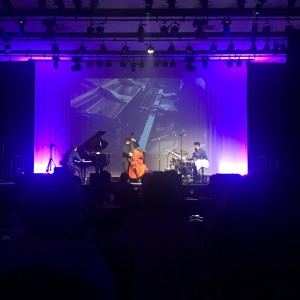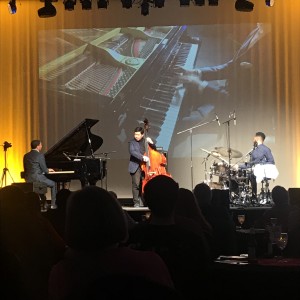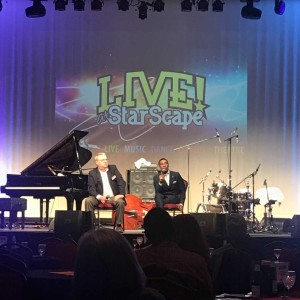Three Guys with Drums, a Bass, and a Piano
FROSTBURG, MD – The audience tapped along as the Christian Sands Trio performed in the Alice R. Manicur Assembly Hall Thursday, April 25.

Melanie Moore, Associate Director of CES, introduced the final performance of the season. Before the Christian Sands Trio took to the stage, Moore took a moment to congratulate two CES graduates, Emily Yankee and Breanna Puryear. Yankee was involved with CES for three years in customer service while majoring in elementary education with a minor in music. Puryear was also involved for three years in artist relations while majoring in elementary education with a concentration in STEM.
The performance was made possible through the Jazz Touring Network program of Mid Atlantic Arts Foundation with support from the National Endowment for the Arts. All CES performances are made possible with support from the Maryland State Arts Council.
Christian Sands, a five-time Grammy Nominee, opened the show on the piano and was joined by Yasushi Nakamura on the bass and Jerome Jennings. Sands hails from New Haven, Conn. and began studying jazz at the age of seven. He has been playing piano for 29 years, adding, “I look like I’m 13” and it’s “all the water I [he] drink.” Sands was eight when he began performing.

The band took a moment to introduce themselves after opening with ‘Stella by Starlight,’ ‘Bolivia,’ and blues improvising. Sands commented on the “wonderful, tropical weather” the audience was experiencing in the Frostburg area. He continued explaining that he arrived back in the U.S. from Tokyo the day prior, Nakamura from Beijing, and Jennings from Shanghai, saying that they haven’t played together in a while, and they “have no idea what time it is.”
Sands introduced Seattle born Nakamura, and Cleveland born Jennings before introducing himself as the “friendly, neighborhood pianist.”
Sands asked the audience if anyone had his CD, and one person raised their hands with the promise from Sands that he’d “buy him a drink after the show.”
The first half of the show concluded with the trio performing Sands’ original composition ‘Reaching for the Sun’ and Ray Brown’s ‘FSR,’ which featured Nakamura.
The audience, comprised of Frostburg students, faculty, staff, and members of the local community, had the opportunity to browse Sands’ CDs and merchandise during intermission. Members of the Frostburg State University Music Department and the Cumberland Jazz Society were in attendance.
The second half of the performance consisted of Mulgrew Miller’s ‘Road,’ Sands’ ‘Rebel Music’ of his album titled Facing Dragons, and his ‘Song of the Rainbow People’ off his album Reach, a piece he wrote “for the people of the world.” The Christian Sands Trio’s performance was received by a standing ovation from the audience.
Charles Dicken, the station director of Frostburg State University’s public radio station WFWM 91.9, took to the stage to initiate the question and answer portion of the evening. Sands then joined Dicken on the stage to answer questions from the audience.

Members of the audience asked about Sands’ beginnings in the jazz world, his influence, and his art. Sands explained he “wants to create layers” in his songs where he wants to feel something and maybe that “something” is not the same thing the audience feels when he performs the piece. He shared his influences with the audience, saying that Aretha Franklin, Blind Willy Johnson, and Miles Davis are the artists that have helped him shape his sound. With those, he had the blues and the soul, commenting that they gave him a chance to experiment.
Sands gave insight into his classical beginnings, eluding that he “was a rebel at heart,” and he “loved to create.” He commented that he would always take things apart and never put it back together. He would learn the original version of a piece before “being free to be creative.” The first jazz piece Sands learned was ‘Take Five,’ and he heard it on an “old Mercedes commercial.” He also shared that his mom played piano in high school and helped him read music until he “started improvising … then she gave up.”
“Music reflects all that you go through,” said Sands. “Every jazz musician should be a storyteller.”
For more on Sands, visit: http://www.christiansandsjazz.com/home




